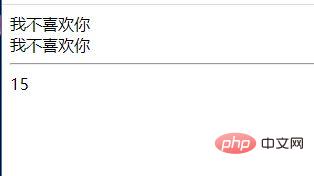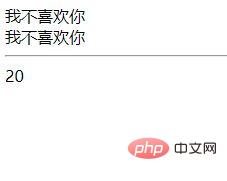
The previous article introduced you to "What are static variables? What are its characteristics? Where is the scope? (With examples)", this article continues to introduce to you what is passing parameters by reference? How to use parameter passing by reference? Assignment of reference parameters? (Code attached), let’s take a look together

What is parameter passing by reference:
In setting When defining function parameters, if you add a symbol before the formal parameter variable, it means that the actual parameter value must be passed by reference (variable reference assignment) when passing the actual parameter to the formal parameter;
If the parameter is passed by reference, then the value of the reference parameter inside the function changes, and the value of the variable corresponding to the external actual parameter will also change. The effect is similar to that of a global variable, but it is not a global variable.
Specifically, we take examples and code as examples;
'; echo $she; ?>
Code analysis:
First define an initial variable ($he) and assign it to, I Like you; followed by another ($she), also wants to say I like you; at this time she finds the address of I like you and assigns it to (she), then we output (echo) $he; and then output ( echo) $she; We will find that both output results are: I like you, the code is as follows:

When we try to change the value of she, at this time $ The value assigned to she is, I don’t like you; when we run this value again, we will find that the displayed results are: I don’t like you; the code is as follows:

According to the above example, we can know that the reference of the variable is actually $he finding the address "I like you" and assigning it to $she, which means that both of them ($he and $she) pass a The address has found a value. Once this value changes, the values of both of them will change identically; that is to say, she is an alias of he. Through the above, we once again understand the reference of the variable;
In reference parameter passing:
'; echo $she; echo '
' ; $num = 15; function demo($no){ $no +=5; } demo($num); echo $num; ?>
Code analysis:
First, we define a variable ($num); Then we define a function (function demo); then we pass a ($no) variable in demo. At this time, when I want to call demo ($num), we output (echo) num, and num will be assigned a value. Give no, and then perform the next operation, and then when we output (num) externally, we find that the result of the code running at this time is still 15 (the running result is as shown below); there is no change; when we add before demo ($no) An address character (&), at this time the result of the operation will display 20 (the operation result is as follows); according to the above, under normal circumstances our actual parameter variable demo ($num) will be assigned to the formal parameter ($no); but the formal parameter The parameter assignment is by reference (&). From the above, it can be seen that the two of them are equivalent to $no=&$num; any change in its value will affect the final result.


Recommended learning: "PHP Video Tutorial"
The above is the detailed content of What is passing parameters by reference? How to use parameter passing by reference? Assignment of reference parameters? (with code). For more information, please follow other related articles on the PHP Chinese website!
 The difference between Fahrenheit and Celsius
The difference between Fahrenheit and Celsius How to install linux system
How to install linux system How to download nvidia control panel
How to download nvidia control panel What are the commonly used commands in postgresql?
What are the commonly used commands in postgresql? Today's Toutiao gold coin is equal to 1 yuan
Today's Toutiao gold coin is equal to 1 yuan How do I set up WeChat to require my consent when people add me to a group?
How do I set up WeChat to require my consent when people add me to a group? border-radius
border-radius How to save programs written in pycharm
How to save programs written in pycharm